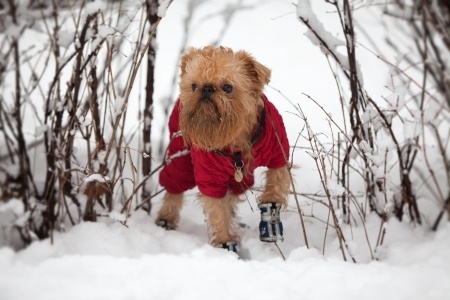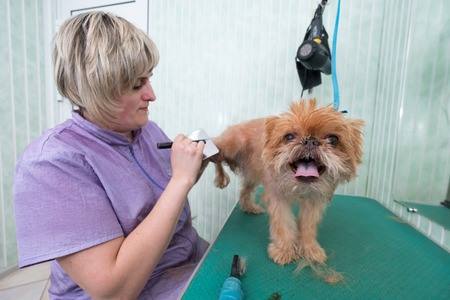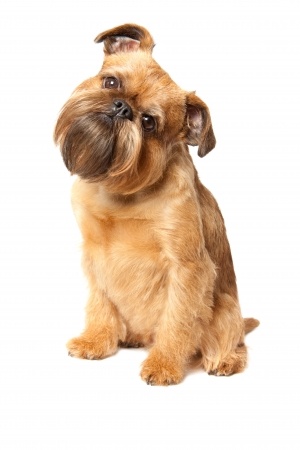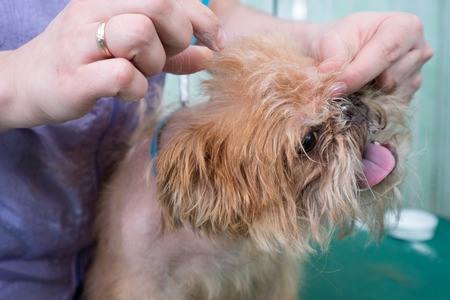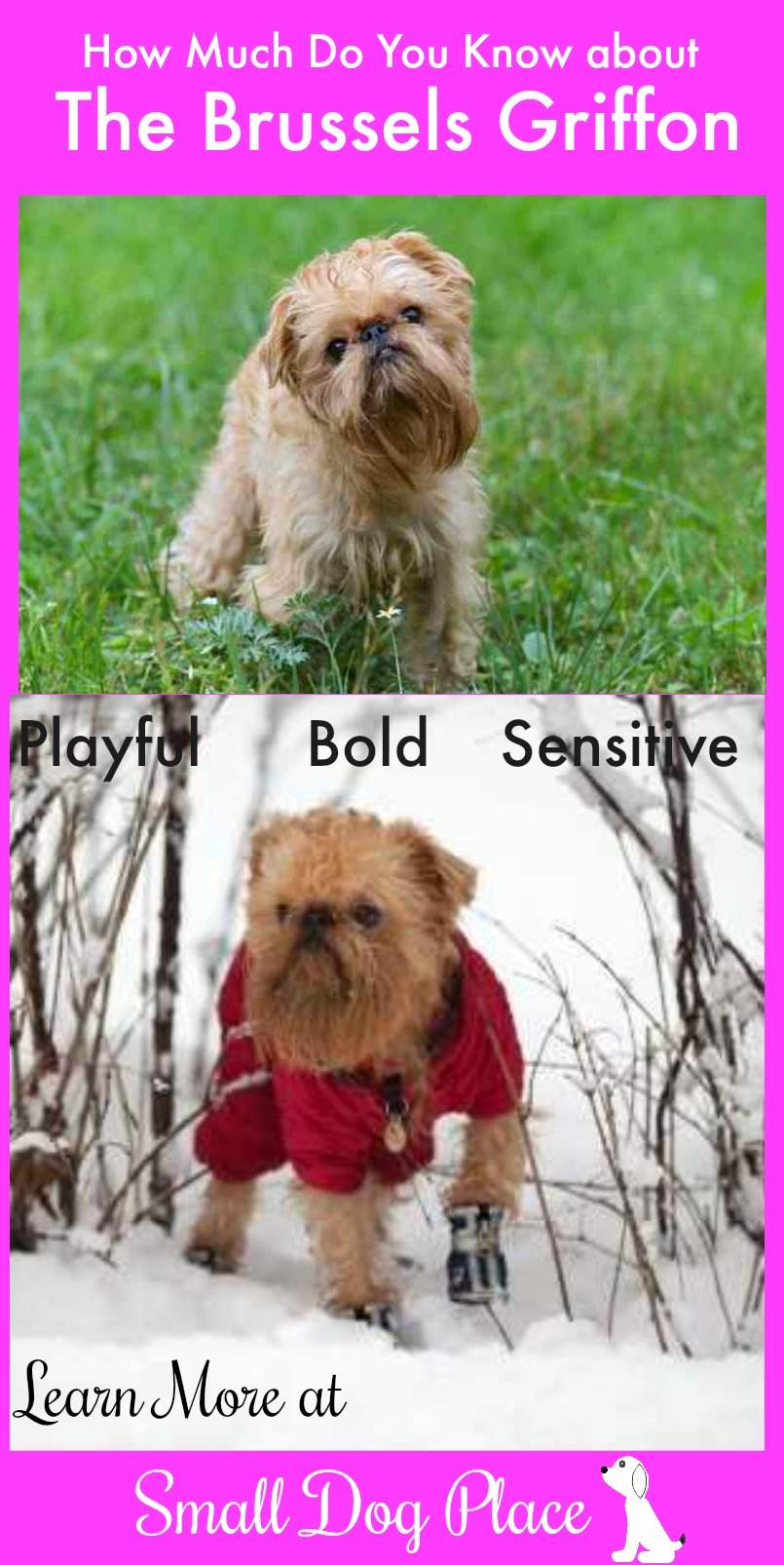The Brussels Griffon
"Velcro Dog"
Brussels Griffon by Janice Jones |Last updated 04-21-2021
Be prepared to be entertained with a Brussels Griffon because he is at his best as the center of attention. You might remember this breed in the sitcom, Spin City or the movie, As Good as It Gets starring Jack Nicholson and Helen Hunt.
Some consider the dog to be the “Velcro” breed, a little companion that is rarely far from his owner, whether he is sitting on your lap, lying on your feet or waiting patiently while you go to the bathroom.
His personality reflects the many breeds that went into making this dog what he is today, affectionate, spunky, sensitive, sweet and cuddly, and comical. He possesses the self-confidence of a terrier and the loving nature of a spaniel.
He’s intelligent, active, and somewhat bossy, refusing to relinquish the spotlight even to a human child. This means that this breed might not be the best choice for families with small children. He could rule the roost if not properly trained and socialized, but there is rarely a dull moment if he is allowed to be by your side.
He acquired his good looks from the various breeds used to develop him in the 1800s. The first thing that most people notice is his “smushed in” face and large soulful eyes. There are two coat varieties, the smooth and wiry coat, each coming in a variety of colors.
All colors and coat textures are combined into one breed in the United States. The tail is usually docked to 1/3 the size in the US and the ears are either cropped or allowed to fold over naturally.
In other countries, there are three distinct breeds: Smooth (Petit Brabancon); the Rough Reds (Brussels Griffon) and all other colors with a rough coat (Belgian Griffon). Each is shown separately in dog shows and they are not interbred.
Quick Facts
Other Names Used (Griffon bruxellois, Petit Brabancon, Belgian Griffon)
Nick Name: Griffon
Affiliation: AKC: Toy
Size
Height: 7 to 8 inches
Weight: 8 to 12 pounds
Coat Type: Rough and Smooth
Colors Red, Black, Black and Tan, and Belge (which is red and black mixed); also seen is Blue, Brown, Chocolate, Tan and Wheaten
Country of Origin: Belgium
Activity Level: Moderate active
Life Expectancy: 12-16 years
Good with Children: Older children but not preschoolers and younger
Good with other pets: Yes
History of the Brussels Griffon
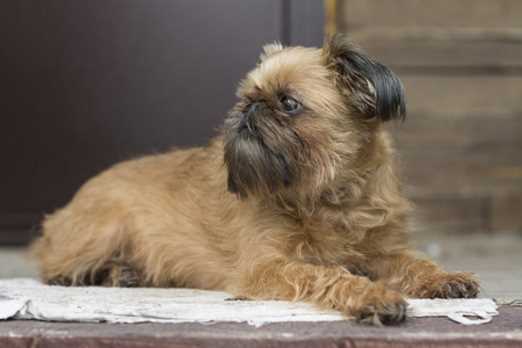
The history of the Griffon is relatively short, dating back to the 1800s, although there is some mention of forerunners of the breed as early as the 16th century in artwork by Van Dyck and later Renoir in his painting, “Bather With Griffon.”
The Griffon was established in Brussels, Belgium. In the early 1800s, small terrier type dogs were used to kill rats and other vermin in stables.
In Belgium, a small terrier type dog, the Griffons d’Ecurie (known as a wire coated stable dog) was crossed and recrossed with an Affenpinscher, a black pug and an English Toy Spaniel.
No records were kept at the time by the men working in the stables who began the mating program, so we do not know how much of each breed contributed to the modern day Brussels Griffon.
From the various crosses, two distinct coat types developed, the wiry coat from the terriers and Affenpinscher, and the smooth coats presumably from the pug.
Smooth-coated Brussels Griffons were called "Brabancons" from the Belgium national anthem. What ended up was a short faced, large eyed, big doomed headed dog that appeared to have the expression of a frown.
First living on the streets and in stables, they eventually became very popular as a companion dog. The present day Brussels Griffon was perfected in the 1870-1880s. They were first shown at the Brussels Exhibition of 1880.
AKC recognized the breed in 1910; they held the 97th ranking position in 2017 making them a relatively rare breed in the United States.
Personality
Every Brussels Griffon Dog is unique, so it’s hard to generalize about temperament, though most are happy, affectionate and very devoted to their people.
Some are more outgoing than others and some even border on being shy. They make good watch dogs, but can be reserved with strangers.
Energy-wise, they run the gamut from being very hyperactive to being very mellow, so learning as much about the puppy or adult you are considering is a must.
Temperament Traits
Brussels Griffons often develop a reputation for being mischievous, digging under the fence, jumping up on tables, overturning trash cans or finding anything left behind by a human that might be interesting to dissect.
Housebreaking is more difficult with this breed than others. They are very intelligent, if not a bit stubborn, but they respond to training as long as it is consistent, positive, and gentle. Rough handling or screaming will never work with this breed. They do want to please their people and will work towards this end.
Activity Level
Griffons, as they are affectionately named by fanciers are active, but can usually obtain most of their exercise requirements with a short walk, romp in the yard or dash around the house.
They seem to love the opportunity just to run for the sake of running and will tear through the house at top speeds. They make excellent apartment dogs, but should always be on a leash when outdoors, if not contained in a fenced-in area.
Their amazing athletic ability is well-known and they do well with agility, obedience, rally and tracking. Being a brachycephalic breed, their exercise should be in moderation. They do not do well in extreme heat and must never be allowed to remain outdoors.
Most Brussels Griffon dogs do well with other pets, even larger dogs but sometimes need to be reminded that they are still only a small dog.
Grooming
This breed comes in two different coat types, the Rough or wiry and the Smooth Coat. Each has its unique needs.
Smooth Coat
The Smooth coat is the easiest to groom. They are soft and smooth and require a weekly brushing. This hair type sheds seasonally, so more brushing when shedding occurs is advised.
To make the coat look glossy, you can use a hound glove over the entire body. Sometimes there are longer hairs that need to be trimmed just to keep them looking neat.
Rough Coat
The rough coat can be clipped down or hand stripped to maintain its rough texture. This coat does not shed, but rather the hair grows out to approximately 3 inches and then dies. New hair grows in the same hair follicle.
Clipping the coat is easiest, and most pet owners opt for this, either doing it themselves or visiting a groomer about every 3 months. A hand stripping knife is used to maintain the harsh coat required for showing the dog. Their body is stripped short, and their legs and beard should remain long.
Other Grooming Tasks
Beyond the coat care, nails need to be clipped on a regular basis and teeth brushed. Their ears will need an occasional cleaning with an ear cleaner and cotton ball and anal glands expressed if necessary.
Health Concerns
Like any dog, the Brussels Griffon is susceptible to any type of contagious disease, internal and exterior parasites and poor lifestyle choices such as obesity.
Beyond that, they are a healthy breed, but some genetic diseases have been identified in the breed. There are screening tests that can identify potential issues in the parents and most reputable breeders will get their breeding stock tested. If you are considering the purchase of a puppy, ask your breeder for more information on these tests and which ones have been performed.
The following are known problems in the breed, but your dog may or may not ever get these diseases.
Pros
- Great Personalities
- Healthy Breed
- Grooming Needs minimal for Smooth variety
- Great Apartment Dogs
- Exercise Needs Minimal
- Great Watch Dogs
- Minimal Shedding
Cons
- Can be Mischievous
- Hard to Housebreak
- Rare Breed: Difficult to find, Expensive
References and Further Reading
For Brussels Griffon Lovers
About Janice (author and voice behind this site)
Having lived with dogs and cats most of her life, Janice served as a veterinary technician for ten years in Maryland and twelve years as a Shih Tzu dog breeder in Ohio.
Her education includes undergraduate degrees in Psychology with a minor in biology, Early Childhood Education, and Nursing, and a master's in Mental Health Counseling.
She is a lifelong learner, a dog lover, and passionate about the welfare of animals. Her favorite breed for over 50 years has been the Shih Tzu, but she has also lived with poodles, Maltese, Yorkshire Terriers, beagles, English bulldogs, carin terriers, and a Cocker Spaniel.
When not writing, reading, and researching dog-related topics, she likes to spend time with her eight Shih Tzu dogs, husband, and family, as well as knitting and crocheting. She is also the voice behind Miracle Shih Tzu and Smart-Knit-Crocheting
Does This Article Deserve Your Thumbs Up?
We always appreciate your support and encouragement. Your thumbs up means so much to us. Please like this article.
If you find this page or any page on Small Dog Place Helpful, or useful in anyway, I'd love it if you would click the small heart found on the bottom right of each page.
You can also share or bookmark this page -- just click on the:

Free Monthly Newsletter
Sign Up for Our Free Newsletter and get our Free Gift to You.
my E-book, The Top 10 Mistakes People Make When Choosing a Dog (and how to avoid them)

